Detailed Nursing Care Plan: Mrs. Anastasia Tsimboulki, Breast Cancer
VerifiedAdded on 2020/01/28
|7
|1572
|121
Report
AI Summary
This report presents a nursing care plan for Mrs. Anastasia Tsimboulki, a 45-year-old Greek Orthodox female diagnosed with invasive lobular carcinoma in her left breast. The plan addresses her specific needs, considering her family history of breast cancer and cultural background. The nursing care plan includes a thorough assessment, identifying risks such as infection and acute pain, and nursing diagnoses related to decisional conflict and deficient knowledge. The expected outcomes focus on pain management, infection prevention, and addressing the patient's fears and concerns. The interventions encompass patient education on hand washing, chemotherapy, and dietary changes. The plan also involves psychosocial support through discussion of fears and referral to social services. The rationale highlights the importance of providing information and support to facilitate informed decision-making and emotional well-being. The evaluation assesses the patient's physical and emotional status, including her understanding of the disease and her attitude towards treatment. The report emphasizes the integration of cultural sensitivity and the importance of addressing the patient's concerns about her family and future.
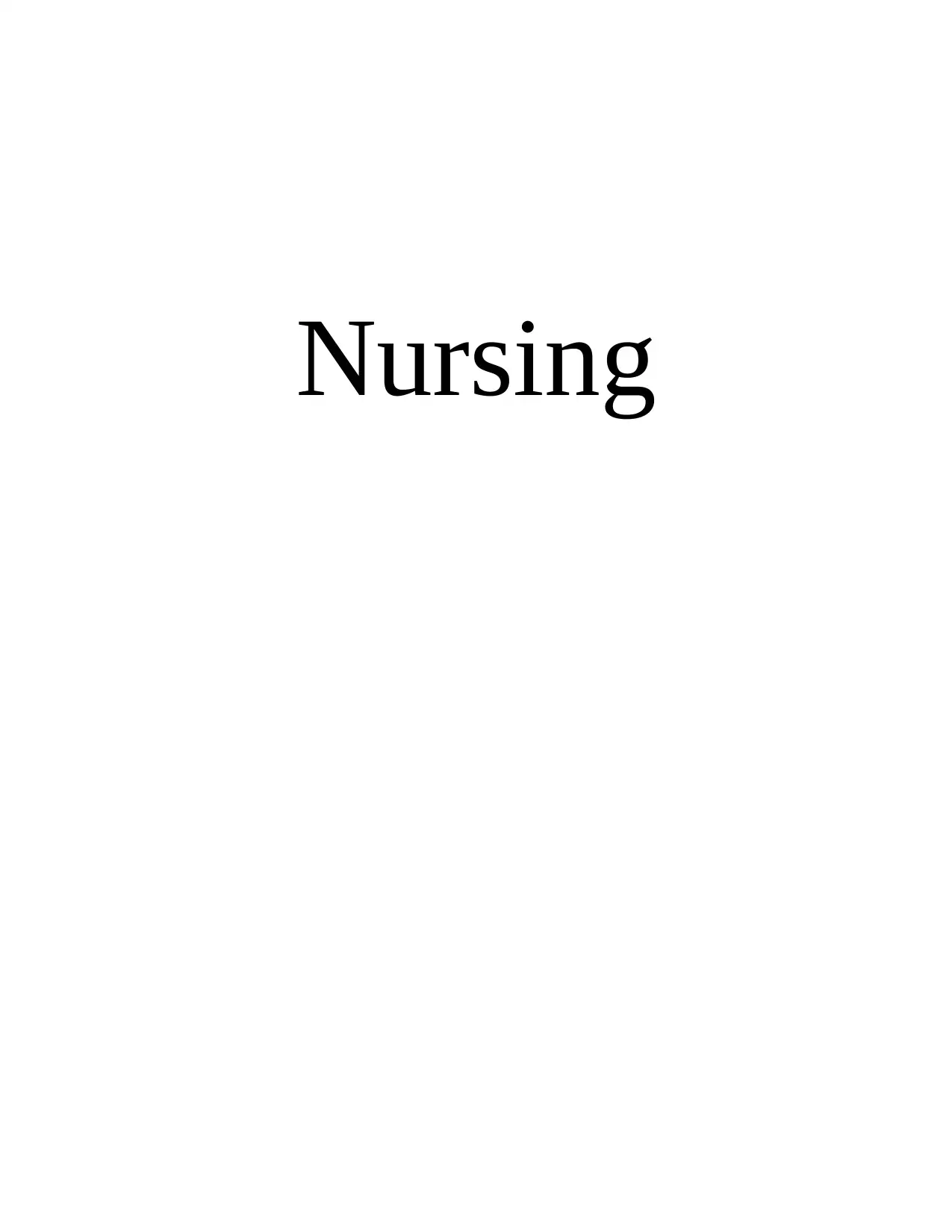
Nursing
Paraphrase This Document
Need a fresh take? Get an instant paraphrase of this document with our AI Paraphraser
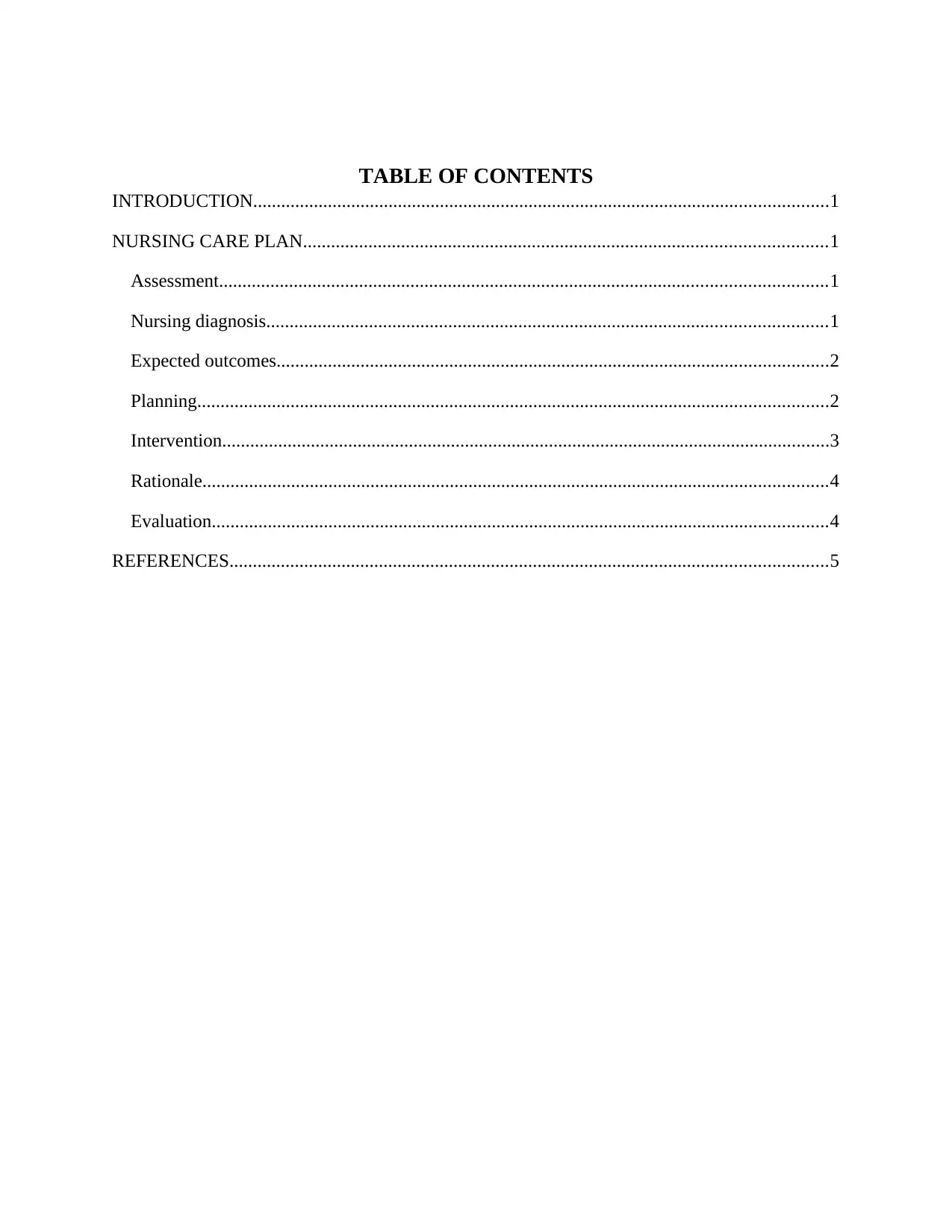
TABLE OF CONTENTS
INTRODUCTION...........................................................................................................................1
NURSING CARE PLAN................................................................................................................1
Assessment..................................................................................................................................1
Nursing diagnosis........................................................................................................................1
Expected outcomes......................................................................................................................2
Planning.......................................................................................................................................2
Intervention..................................................................................................................................3
Rationale......................................................................................................................................4
Evaluation....................................................................................................................................4
REFERENCES................................................................................................................................5
INTRODUCTION...........................................................................................................................1
NURSING CARE PLAN................................................................................................................1
Assessment..................................................................................................................................1
Nursing diagnosis........................................................................................................................1
Expected outcomes......................................................................................................................2
Planning.......................................................................................................................................2
Intervention..................................................................................................................................3
Rationale......................................................................................................................................4
Evaluation....................................................................................................................................4
REFERENCES................................................................................................................................5
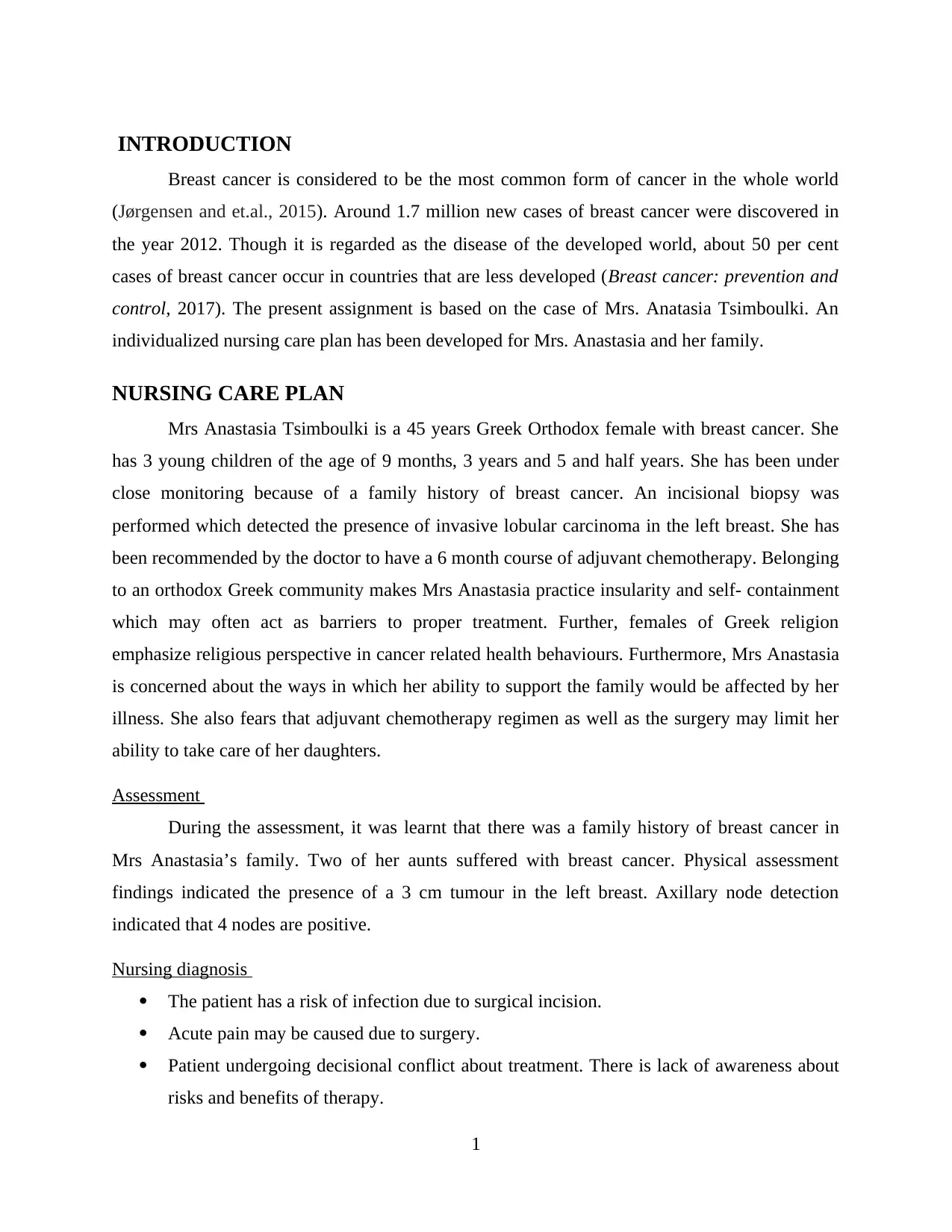
INTRODUCTION
Breast cancer is considered to be the most common form of cancer in the whole world
(Jørgensen and et.al., 2015). Around 1.7 million new cases of breast cancer were discovered in
the year 2012. Though it is regarded as the disease of the developed world, about 50 per cent
cases of breast cancer occur in countries that are less developed (Breast cancer: prevention and
control, 2017). The present assignment is based on the case of Mrs. Anatasia Tsimboulki. An
individualized nursing care plan has been developed for Mrs. Anastasia and her family.
NURSING CARE PLAN
Mrs Anastasia Tsimboulki is a 45 years Greek Orthodox female with breast cancer. She
has 3 young children of the age of 9 months, 3 years and 5 and half years. She has been under
close monitoring because of a family history of breast cancer. An incisional biopsy was
performed which detected the presence of invasive lobular carcinoma in the left breast. She has
been recommended by the doctor to have a 6 month course of adjuvant chemotherapy. Belonging
to an orthodox Greek community makes Mrs Anastasia practice insularity and self- containment
which may often act as barriers to proper treatment. Further, females of Greek religion
emphasize religious perspective in cancer related health behaviours. Furthermore, Mrs Anastasia
is concerned about the ways in which her ability to support the family would be affected by her
illness. She also fears that adjuvant chemotherapy regimen as well as the surgery may limit her
ability to take care of her daughters.
Assessment
During the assessment, it was learnt that there was a family history of breast cancer in
Mrs Anastasia’s family. Two of her aunts suffered with breast cancer. Physical assessment
findings indicated the presence of a 3 cm tumour in the left breast. Axillary node detection
indicated that 4 nodes are positive.
Nursing diagnosis
The patient has a risk of infection due to surgical incision.
Acute pain may be caused due to surgery.
Patient undergoing decisional conflict about treatment. There is lack of awareness about
risks and benefits of therapy.
1
Breast cancer is considered to be the most common form of cancer in the whole world
(Jørgensen and et.al., 2015). Around 1.7 million new cases of breast cancer were discovered in
the year 2012. Though it is regarded as the disease of the developed world, about 50 per cent
cases of breast cancer occur in countries that are less developed (Breast cancer: prevention and
control, 2017). The present assignment is based on the case of Mrs. Anatasia Tsimboulki. An
individualized nursing care plan has been developed for Mrs. Anastasia and her family.
NURSING CARE PLAN
Mrs Anastasia Tsimboulki is a 45 years Greek Orthodox female with breast cancer. She
has 3 young children of the age of 9 months, 3 years and 5 and half years. She has been under
close monitoring because of a family history of breast cancer. An incisional biopsy was
performed which detected the presence of invasive lobular carcinoma in the left breast. She has
been recommended by the doctor to have a 6 month course of adjuvant chemotherapy. Belonging
to an orthodox Greek community makes Mrs Anastasia practice insularity and self- containment
which may often act as barriers to proper treatment. Further, females of Greek religion
emphasize religious perspective in cancer related health behaviours. Furthermore, Mrs Anastasia
is concerned about the ways in which her ability to support the family would be affected by her
illness. She also fears that adjuvant chemotherapy regimen as well as the surgery may limit her
ability to take care of her daughters.
Assessment
During the assessment, it was learnt that there was a family history of breast cancer in
Mrs Anastasia’s family. Two of her aunts suffered with breast cancer. Physical assessment
findings indicated the presence of a 3 cm tumour in the left breast. Axillary node detection
indicated that 4 nodes are positive.
Nursing diagnosis
The patient has a risk of infection due to surgical incision.
Acute pain may be caused due to surgery.
Patient undergoing decisional conflict about treatment. There is lack of awareness about
risks and benefits of therapy.
1
⊘ This is a preview!⊘
Do you want full access?
Subscribe today to unlock all pages.

Trusted by 1+ million students worldwide
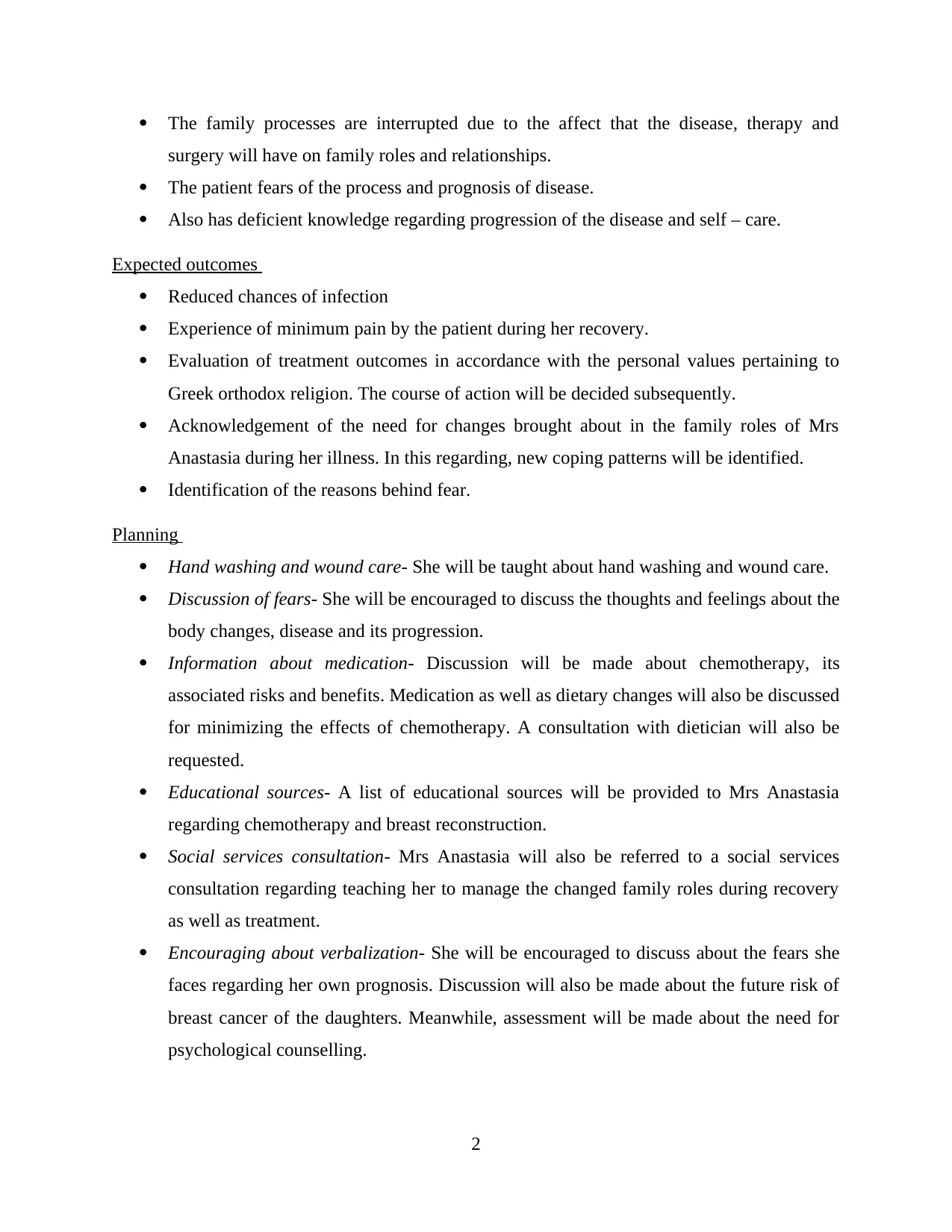
The family processes are interrupted due to the affect that the disease, therapy and
surgery will have on family roles and relationships.
The patient fears of the process and prognosis of disease.
Also has deficient knowledge regarding progression of the disease and self – care.
Expected outcomes
Reduced chances of infection
Experience of minimum pain by the patient during her recovery.
Evaluation of treatment outcomes in accordance with the personal values pertaining to
Greek orthodox religion. The course of action will be decided subsequently.
Acknowledgement of the need for changes brought about in the family roles of Mrs
Anastasia during her illness. In this regarding, new coping patterns will be identified.
Identification of the reasons behind fear.
Planning
Hand washing and wound care- She will be taught about hand washing and wound care.
Discussion of fears- She will be encouraged to discuss the thoughts and feelings about the
body changes, disease and its progression.
Information about medication- Discussion will be made about chemotherapy, its
associated risks and benefits. Medication as well as dietary changes will also be discussed
for minimizing the effects of chemotherapy. A consultation with dietician will also be
requested.
Educational sources- A list of educational sources will be provided to Mrs Anastasia
regarding chemotherapy and breast reconstruction.
Social services consultation- Mrs Anastasia will also be referred to a social services
consultation regarding teaching her to manage the changed family roles during recovery
as well as treatment.
Encouraging about verbalization- She will be encouraged to discuss about the fears she
faces regarding her own prognosis. Discussion will also be made about the future risk of
breast cancer of the daughters. Meanwhile, assessment will be made about the need for
psychological counselling.
2
surgery will have on family roles and relationships.
The patient fears of the process and prognosis of disease.
Also has deficient knowledge regarding progression of the disease and self – care.
Expected outcomes
Reduced chances of infection
Experience of minimum pain by the patient during her recovery.
Evaluation of treatment outcomes in accordance with the personal values pertaining to
Greek orthodox religion. The course of action will be decided subsequently.
Acknowledgement of the need for changes brought about in the family roles of Mrs
Anastasia during her illness. In this regarding, new coping patterns will be identified.
Identification of the reasons behind fear.
Planning
Hand washing and wound care- She will be taught about hand washing and wound care.
Discussion of fears- She will be encouraged to discuss the thoughts and feelings about the
body changes, disease and its progression.
Information about medication- Discussion will be made about chemotherapy, its
associated risks and benefits. Medication as well as dietary changes will also be discussed
for minimizing the effects of chemotherapy. A consultation with dietician will also be
requested.
Educational sources- A list of educational sources will be provided to Mrs Anastasia
regarding chemotherapy and breast reconstruction.
Social services consultation- Mrs Anastasia will also be referred to a social services
consultation regarding teaching her to manage the changed family roles during recovery
as well as treatment.
Encouraging about verbalization- She will be encouraged to discuss about the fears she
faces regarding her own prognosis. Discussion will also be made about the future risk of
breast cancer of the daughters. Meanwhile, assessment will be made about the need for
psychological counselling.
2
Paraphrase This Document
Need a fresh take? Get an instant paraphrase of this document with our AI Paraphraser
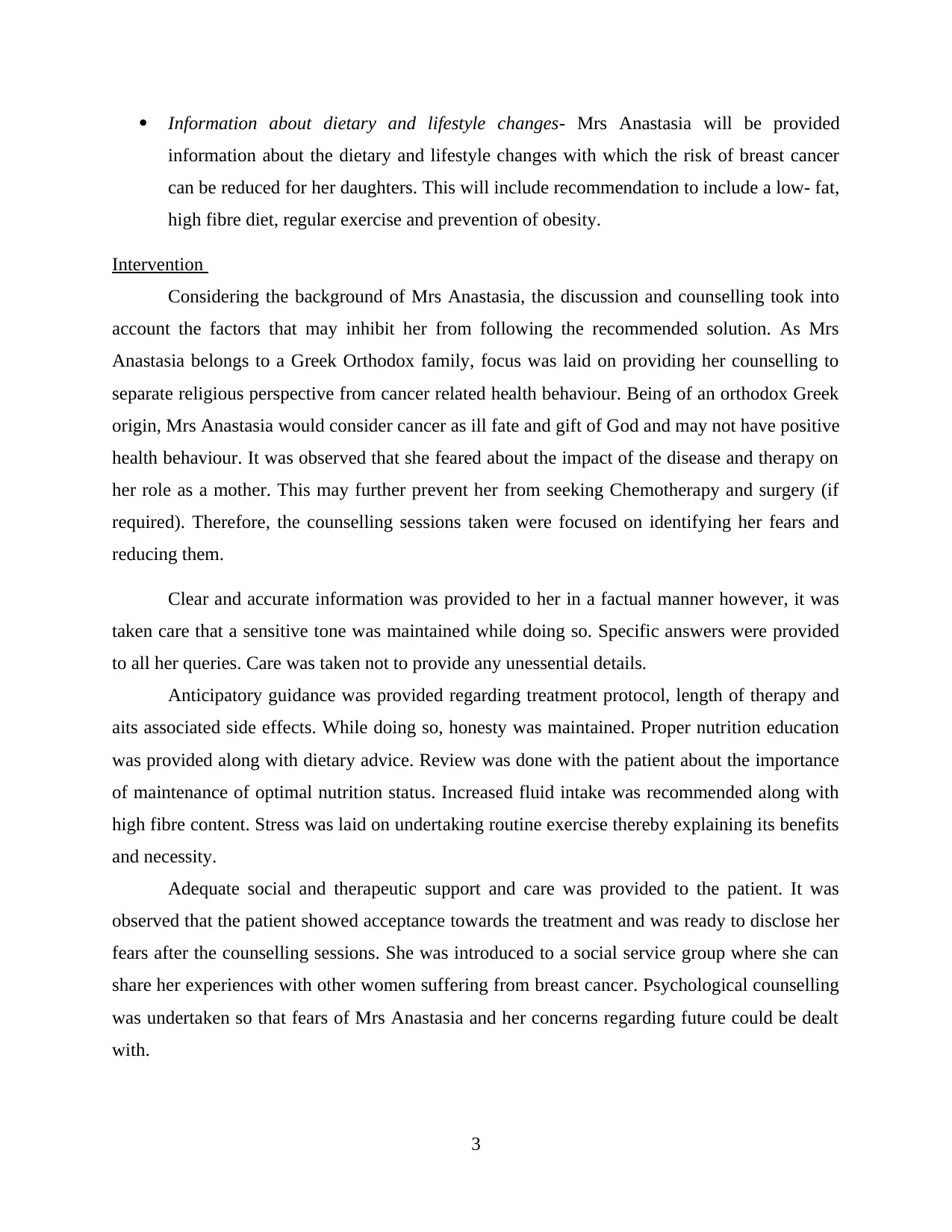
Information about dietary and lifestyle changes- Mrs Anastasia will be provided
information about the dietary and lifestyle changes with which the risk of breast cancer
can be reduced for her daughters. This will include recommendation to include a low- fat,
high fibre diet, regular exercise and prevention of obesity.
Intervention
Considering the background of Mrs Anastasia, the discussion and counselling took into
account the factors that may inhibit her from following the recommended solution. As Mrs
Anastasia belongs to a Greek Orthodox family, focus was laid on providing her counselling to
separate religious perspective from cancer related health behaviour. Being of an orthodox Greek
origin, Mrs Anastasia would consider cancer as ill fate and gift of God and may not have positive
health behaviour. It was observed that she feared about the impact of the disease and therapy on
her role as a mother. This may further prevent her from seeking Chemotherapy and surgery (if
required). Therefore, the counselling sessions taken were focused on identifying her fears and
reducing them.
Clear and accurate information was provided to her in a factual manner however, it was
taken care that a sensitive tone was maintained while doing so. Specific answers were provided
to all her queries. Care was taken not to provide any unessential details.
Anticipatory guidance was provided regarding treatment protocol, length of therapy and
aits associated side effects. While doing so, honesty was maintained. Proper nutrition education
was provided along with dietary advice. Review was done with the patient about the importance
of maintenance of optimal nutrition status. Increased fluid intake was recommended along with
high fibre content. Stress was laid on undertaking routine exercise thereby explaining its benefits
and necessity.
Adequate social and therapeutic support and care was provided to the patient. It was
observed that the patient showed acceptance towards the treatment and was ready to disclose her
fears after the counselling sessions. She was introduced to a social service group where she can
share her experiences with other women suffering from breast cancer. Psychological counselling
was undertaken so that fears of Mrs Anastasia and her concerns regarding future could be dealt
with.
3
information about the dietary and lifestyle changes with which the risk of breast cancer
can be reduced for her daughters. This will include recommendation to include a low- fat,
high fibre diet, regular exercise and prevention of obesity.
Intervention
Considering the background of Mrs Anastasia, the discussion and counselling took into
account the factors that may inhibit her from following the recommended solution. As Mrs
Anastasia belongs to a Greek Orthodox family, focus was laid on providing her counselling to
separate religious perspective from cancer related health behaviour. Being of an orthodox Greek
origin, Mrs Anastasia would consider cancer as ill fate and gift of God and may not have positive
health behaviour. It was observed that she feared about the impact of the disease and therapy on
her role as a mother. This may further prevent her from seeking Chemotherapy and surgery (if
required). Therefore, the counselling sessions taken were focused on identifying her fears and
reducing them.
Clear and accurate information was provided to her in a factual manner however, it was
taken care that a sensitive tone was maintained while doing so. Specific answers were provided
to all her queries. Care was taken not to provide any unessential details.
Anticipatory guidance was provided regarding treatment protocol, length of therapy and
aits associated side effects. While doing so, honesty was maintained. Proper nutrition education
was provided along with dietary advice. Review was done with the patient about the importance
of maintenance of optimal nutrition status. Increased fluid intake was recommended along with
high fibre content. Stress was laid on undertaking routine exercise thereby explaining its benefits
and necessity.
Adequate social and therapeutic support and care was provided to the patient. It was
observed that the patient showed acceptance towards the treatment and was ready to disclose her
fears after the counselling sessions. She was introduced to a social service group where she can
share her experiences with other women suffering from breast cancer. Psychological counselling
was undertaken so that fears of Mrs Anastasia and her concerns regarding future could be dealt
with.
3
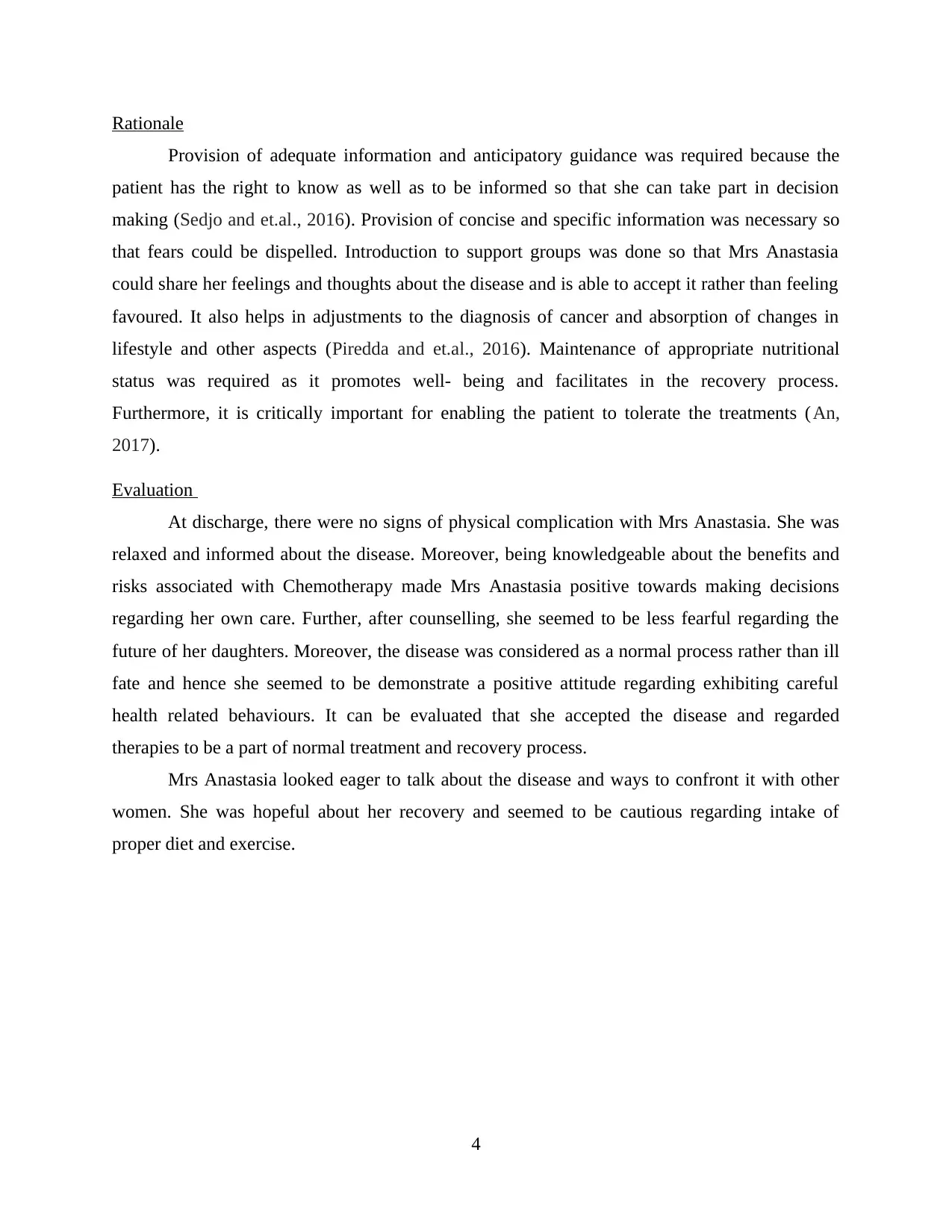
Rationale
Provision of adequate information and anticipatory guidance was required because the
patient has the right to know as well as to be informed so that she can take part in decision
making (Sedjo and et.al., 2016). Provision of concise and specific information was necessary so
that fears could be dispelled. Introduction to support groups was done so that Mrs Anastasia
could share her feelings and thoughts about the disease and is able to accept it rather than feeling
favoured. It also helps in adjustments to the diagnosis of cancer and absorption of changes in
lifestyle and other aspects (Piredda and et.al., 2016). Maintenance of appropriate nutritional
status was required as it promotes well- being and facilitates in the recovery process.
Furthermore, it is critically important for enabling the patient to tolerate the treatments (An,
2017).
Evaluation
At discharge, there were no signs of physical complication with Mrs Anastasia. She was
relaxed and informed about the disease. Moreover, being knowledgeable about the benefits and
risks associated with Chemotherapy made Mrs Anastasia positive towards making decisions
regarding her own care. Further, after counselling, she seemed to be less fearful regarding the
future of her daughters. Moreover, the disease was considered as a normal process rather than ill
fate and hence she seemed to be demonstrate a positive attitude regarding exhibiting careful
health related behaviours. It can be evaluated that she accepted the disease and regarded
therapies to be a part of normal treatment and recovery process.
Mrs Anastasia looked eager to talk about the disease and ways to confront it with other
women. She was hopeful about her recovery and seemed to be cautious regarding intake of
proper diet and exercise.
4
Provision of adequate information and anticipatory guidance was required because the
patient has the right to know as well as to be informed so that she can take part in decision
making (Sedjo and et.al., 2016). Provision of concise and specific information was necessary so
that fears could be dispelled. Introduction to support groups was done so that Mrs Anastasia
could share her feelings and thoughts about the disease and is able to accept it rather than feeling
favoured. It also helps in adjustments to the diagnosis of cancer and absorption of changes in
lifestyle and other aspects (Piredda and et.al., 2016). Maintenance of appropriate nutritional
status was required as it promotes well- being and facilitates in the recovery process.
Furthermore, it is critically important for enabling the patient to tolerate the treatments (An,
2017).
Evaluation
At discharge, there were no signs of physical complication with Mrs Anastasia. She was
relaxed and informed about the disease. Moreover, being knowledgeable about the benefits and
risks associated with Chemotherapy made Mrs Anastasia positive towards making decisions
regarding her own care. Further, after counselling, she seemed to be less fearful regarding the
future of her daughters. Moreover, the disease was considered as a normal process rather than ill
fate and hence she seemed to be demonstrate a positive attitude regarding exhibiting careful
health related behaviours. It can be evaluated that she accepted the disease and regarded
therapies to be a part of normal treatment and recovery process.
Mrs Anastasia looked eager to talk about the disease and ways to confront it with other
women. She was hopeful about her recovery and seemed to be cautious regarding intake of
proper diet and exercise.
4
⊘ This is a preview!⊘
Do you want full access?
Subscribe today to unlock all pages.

Trusted by 1+ million students worldwide
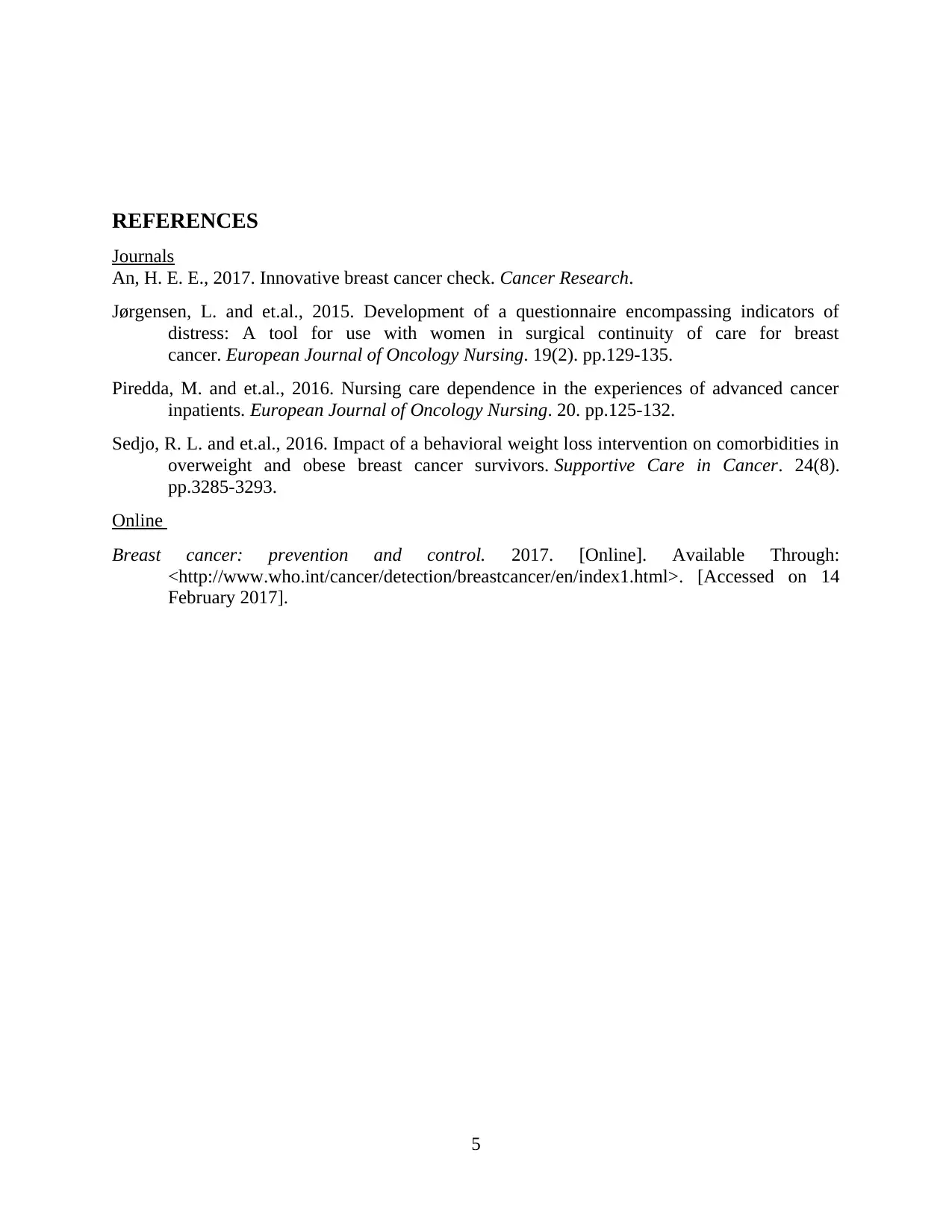
REFERENCES
Journals
An, H. E. E., 2017. Innovative breast cancer check. Cancer Research.
Jørgensen, L. and et.al., 2015. Development of a questionnaire encompassing indicators of
distress: A tool for use with women in surgical continuity of care for breast
cancer. European Journal of Oncology Nursing. 19(2). pp.129-135.
Piredda, M. and et.al., 2016. Nursing care dependence in the experiences of advanced cancer
inpatients. European Journal of Oncology Nursing. 20. pp.125-132.
Sedjo, R. L. and et.al., 2016. Impact of a behavioral weight loss intervention on comorbidities in
overweight and obese breast cancer survivors. Supportive Care in Cancer. 24(8).
pp.3285-3293.
Online
Breast cancer: prevention and control. 2017. [Online]. Available Through:
<http://www.who.int/cancer/detection/breastcancer/en/index1.html>. [Accessed on 14
February 2017].
5
Journals
An, H. E. E., 2017. Innovative breast cancer check. Cancer Research.
Jørgensen, L. and et.al., 2015. Development of a questionnaire encompassing indicators of
distress: A tool for use with women in surgical continuity of care for breast
cancer. European Journal of Oncology Nursing. 19(2). pp.129-135.
Piredda, M. and et.al., 2016. Nursing care dependence in the experiences of advanced cancer
inpatients. European Journal of Oncology Nursing. 20. pp.125-132.
Sedjo, R. L. and et.al., 2016. Impact of a behavioral weight loss intervention on comorbidities in
overweight and obese breast cancer survivors. Supportive Care in Cancer. 24(8).
pp.3285-3293.
Online
Breast cancer: prevention and control. 2017. [Online]. Available Through:
<http://www.who.int/cancer/detection/breastcancer/en/index1.html>. [Accessed on 14
February 2017].
5
1 out of 7
Related Documents
Your All-in-One AI-Powered Toolkit for Academic Success.
+13062052269
info@desklib.com
Available 24*7 on WhatsApp / Email
![[object Object]](/_next/static/media/star-bottom.7253800d.svg)
Unlock your academic potential
Copyright © 2020–2026 A2Z Services. All Rights Reserved. Developed and managed by ZUCOL.





